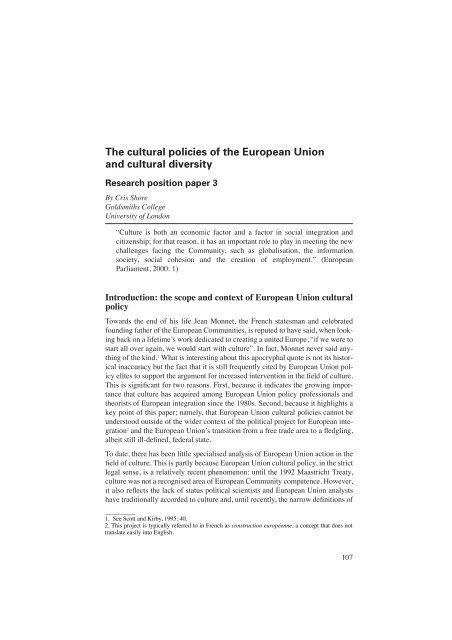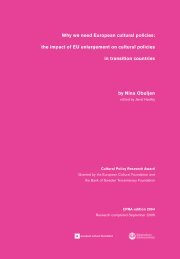<strong>Differing</strong> <strong>diversities</strong>Thompson, Eric C., 1998, Contingent valuation in arts impact studies, Journal <strong>of</strong>Arts Management, Law and Society, Vol. 28, No. 3, pp. 206-210.Vedung, Evert, 1998, Policy instruments: typologies and theories, in M.-L.Bemelmans-Videc, R.C. Rist and E. Vedung (eds.), Carrots, Sticks and Sermons.Policy Instruments and Their Evaluation, London: Transaction Publishers.Weiss, Janet A. and Mary Tschirhart, 1994, Public information campaigns aspolicy instruments, Journal <strong>of</strong> Policy Analysis and Management, Vol. 13, No. 1,pp. 82-119.Wyszomirski, Margaret J., 1998, The arts and performance review, policy assessmentand programme evaluation: focusing on the ends <strong>of</strong> the policy cycle, Journal<strong>of</strong> Arts Management, Law and Society, Vol. 28, No. 3, pp. 191-199.Zinno, Sally, 1998, National Arts Stabilization evaluation research project,Journal <strong>of</strong> Arts Management, Law and Society, Vol. 28, No. 3, pp. 220ff.106
The cultural policies <strong>of</strong> the <strong>Europe</strong>an Unionand cultural diversityResearch position paper 3By Cris ShoreGoldsmiths CollegeUniversity <strong>of</strong> London“Culture is both an economic factor and a factor in social integration andcitizenship; for that reason, it has an important role to play in meeting the newchallenges facing the Community, such as globalisation, the informationsociety, social cohesion and the creation <strong>of</strong> employment.” (<strong>Europe</strong>anParliament, 2000: 1)Introduction: the scope and context <strong>of</strong> <strong>Europe</strong>an Union culturalpolicyTowards the end <strong>of</strong> his life Jean Monnet, the French statesman and celebratedfounding father <strong>of</strong> the <strong>Europe</strong>an Communities, is reputed to have said, when lookingback on a lifetime’s work dedicated to creating a united <strong>Europe</strong>, “if we were tostart all over again, we would start with culture”. In fact, Monnet never said anything<strong>of</strong> the kind. 1 What is interesting about this apocryphal quote is not its historicalinaccuracy but the fact that it is still frequently cited by <strong>Europe</strong>an Union policyelites to support the argument for increased intervention in the field <strong>of</strong> culture.This is significant for two reasons. First, because it indicates the growing importancethat culture has acquired among <strong>Europe</strong>an Union policy pr<strong>of</strong>essionals andtheorists <strong>of</strong> <strong>Europe</strong>an integration since the 1980s. Second, because it highlights akey point <strong>of</strong> this paper; namely, that <strong>Europe</strong>an Union cultural policies cannot beunderstood outside <strong>of</strong> the wider context <strong>of</strong> the political project for <strong>Europe</strong>an integration2 and the <strong>Europe</strong>an Union’s transition from a free trade area to a fledgling,albeit still ill-defined, federal state.To date, there has been little specialised analysis <strong>of</strong> <strong>Europe</strong>an Union action in thefield <strong>of</strong> culture. This is partly because <strong>Europe</strong>an Union cultural policy, in the strictlegal sense, is a relatively recent phenomenon: until the 1992 Maastricht Treaty,culture was not a recognised area <strong>of</strong> <strong>Europe</strong>an Community competence. However,it also reflects the lack <strong>of</strong> status political scientists and <strong>Europe</strong>an Union analystshave traditionally accorded to culture and, until recently, the narrow definitions <strong>of</strong>__________1. See Scott and Kirby, 1995: 40.2. This project is typically referred to in French as construction européenne, a concept that does nottranslate easily into English.107
- Page 5 and 6:
PrefaceThe present text constitutes
- Page 7:
Part IDiffering diversities:transve
- Page 11 and 12:
The study: background, contextand m
- Page 13 and 14:
Transversal study on the theme of c
- Page 15:
Transversal study on the theme of c
- Page 18:
Differing diversitiesi. new forms o
- Page 23 and 24:
IntroductionTransversal perspective
- Page 25 and 26:
Transversal study on the theme of c
- Page 27 and 28:
The challenge of diversityCulture,
- Page 29 and 30:
Transversal study on the theme of c
- Page 31 and 32:
Transversal study on the theme of c
- Page 33 and 34:
Diversity, citizenship, and cultura
- Page 35 and 36:
Transversal study on the theme of c
- Page 37:
Transversal study on the theme of c
- Page 40 and 41:
Differing diversitieslanguages. The
- Page 42 and 43:
Differing diversitiesprogrammes int
- Page 45 and 46:
Culture, government and diversity:p
- Page 47 and 48:
Transversal study on the theme of c
- Page 49 and 50:
Transversal study on the theme of c
- Page 51 and 52:
Transversal study on the theme of c
- Page 53:
Transversal study on the theme of c
- Page 56 and 57: Differing diversitiesin the pursuit
- Page 58 and 59: Differing diversitiesthe need for m
- Page 60 and 61: Differing diversitiescircumstances
- Page 62 and 63: Differing diversitiesclasses artist
- Page 64 and 65: Differing diversitiesMy point, then
- Page 66 and 67: Differing diversitiesiii. that the
- Page 69: Transversal study on the theme of c
- Page 73 and 74: The consequences of European media
- Page 75 and 76: Reasearch position paper 1and contr
- Page 77 and 78: Reasearch position paper 1directly
- Page 79 and 80: Reasearch position paper 1There hav
- Page 81 and 82: Reasearch position paper 1presence
- Page 83 and 84: Reasearch position paper 1Strategic
- Page 85 and 86: Reasearch position paper 1New media
- Page 87 and 88: Reasearch position paper 1Blumler,
- Page 89 and 90: Reasearch position paper 1Hoffmann-
- Page 91 and 92: Reasearch position paper 1Pauwels,
- Page 93 and 94: Assessing the implementationof cult
- Page 95 and 96: Reasearch position paper 2tics abou
- Page 97 and 98: Reasearch position paper 2Act (GPRA
- Page 99 and 100: Reasearch position paper 2factually
- Page 101 and 102: Reasearch position paper 2The evalu
- Page 103 and 104: Reasearch position paper 2capacity
- Page 105: Reasearch position paper 2Luchtenbe
- Page 109 and 110: Reasearch position paper 3went, wou
- Page 111 and 112: Reasearch position paper 3The histo
- Page 113 and 114: Reasearch position paper 3integrati
- Page 115 and 116: Reasearch position paper 3of differ
- Page 117 and 118: Reasearch position paper 3European
- Page 119 and 120: Reasearch position paper 3voice to
- Page 121: Reasearch position paper 3Howe, Mar
- Page 124 and 125: Differing diversitiesContemporary d
- Page 126 and 127: Differing diversitiesWhereas in the
- Page 128 and 129: Differing diversitiesbuilding on th
- Page 130 and 131: Differing diversitieswhen tackling
- Page 132 and 133: Differing diversitiesand that is pr
- Page 134 and 135: Differing diversitiesSennett, Richa
- Page 136 and 137: Differing diversitiesallowing their
- Page 138 and 139: Differing diversitiesNevertheless,
- Page 140 and 141: Differing diversitiesgrowth also ex
- Page 142 and 143: Differing diversitiesAt a deeper le
- Page 144 and 145: Differing diversitiesconventional c
- Page 146 and 147: Differing diversitiesworks, and the
- Page 148 and 149: Differing diversitiesNational sover
- Page 150 and 151: Differing diversitiesSimilarly, at
- Page 152 and 153: Differing diversitiesCoombe, Rosema
- Page 154 and 155: Differing diversitiesWoodmansee, Ma
- Page 156 and 157:
Differing diversitiesIndeed, which
- Page 158 and 159:
Differing diversitiesThe second maj
- Page 160 and 161:
Differing diversitiesexample by Hol
- Page 162 and 163:
Differing diversitiesincreased broa
- Page 164 and 165:
Differing diversities“Black Carib
- Page 166 and 167:
Differing diversitiesBunt, Gary, 19
- Page 169 and 170:
Preserving cultural diversity throu
- Page 171 and 172:
Reasearch position paper 7unique, t
- Page 173 and 174:
Reasearch position paper 7legislati
- Page 175 and 176:
Reasearch position paper 7appropria
- Page 177 and 178:
Reasearch position paper 7Indeed, m
- Page 179 and 180:
Reasearch position paper 7- means t
- Page 181 and 182:
Reasearch position paper 7cyberspac
- Page 183 and 184:
Reasearch position paper 7extended
- Page 185 and 186:
Reasearch position paper 7It is rec
- Page 187 and 188:
Reasearch position paper 7lose loca
- Page 189 and 190:
Reasearch position paper 7six proje
- Page 191 and 192:
Reasearch position paper 7and innov
- Page 193 and 194:
Reasearch position paper 7Programme
- Page 195 and 196:
Reasearch position paper 7Reference
- Page 197 and 198:
Reasearch position paper 7Papers on
- Page 199:
Reasearch position paper 7Swaminath
- Page 202:
Sales agents for publications of th














